Church in Uganda is always interesting and lively. Every week, I’m thankful that I get to be a participant. Here is a video with a glimpse into an average trip to church on Sunday.
Church in Uganda is always interesting and lively. Every week, I’m thankful that I get to be a participant. Here is a video with a glimpse into an average trip to church on Sunday.
Question: What do you do if something you bought in the US breaks when you get it to Uganda? There are no repairmen for this item in the whole country. There is no place to get parts. How do you deal with it?
You figure out how to fix it yourself.
Ugandan furniture isn’t the same quality as American. But even more importantly, it’s short. Much shorter than the tall people who live at my house. We tried it when we first arrived here and discovered it wasn’t all that comfortable.
So, back in 2015, when we shipped our container of books, we had enough room to include some furniture from America, furniture that would be tall enough for all our tall people here.
Due to a variety of circumstance that I won’t go into here, half of the loveseat/recliner broke. A metal piece bent and we couldn’t figure out a way to get it straight again. It eventually reached the point where it was uncomfortable to use.
It’s frustrating to have something like that in your house, a constant reminder that no one around has the expertise to make a needed repair, simply by virtue of the fact that they’ve never encountered it. After a long, think-outside-the-box discussion a couple weeks ago, James decided to make another go at figuring out how to fix it.
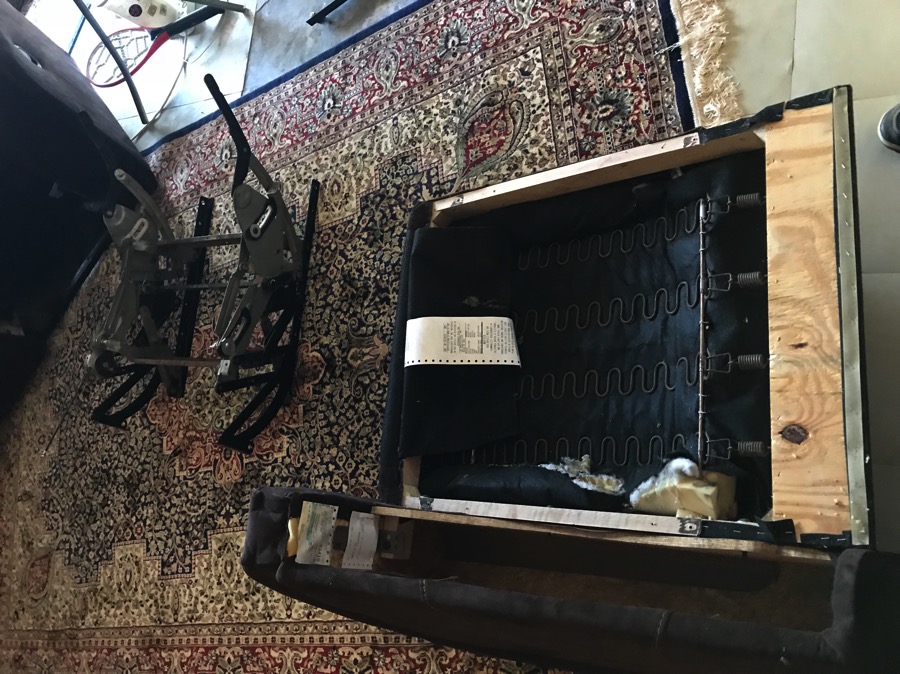
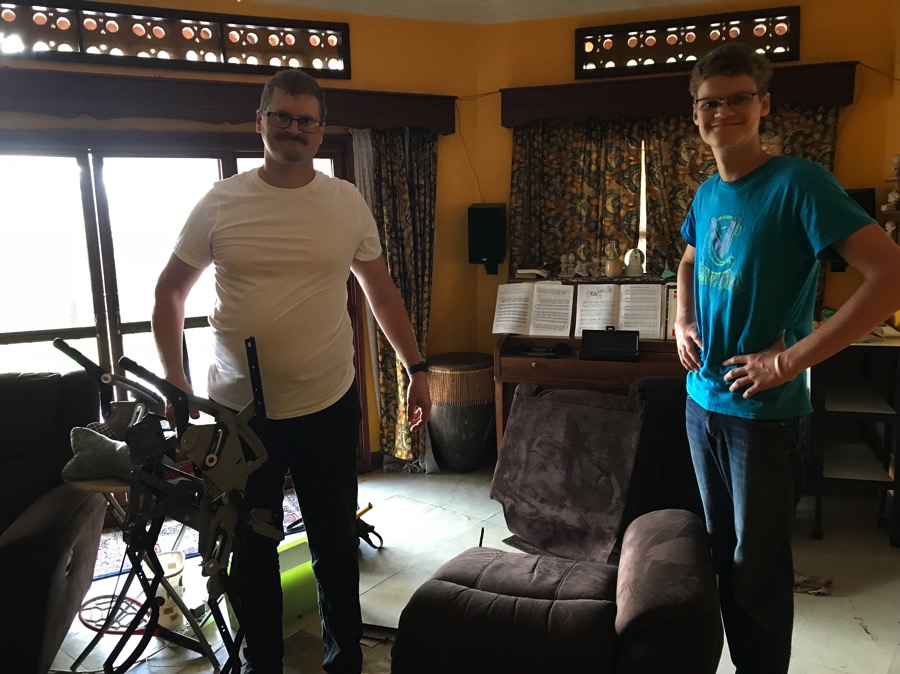
He and Ethan took the chair apart and figured out a way to straighten the metal pieces that were bent. Then they put the whole thing together again. The lever that raised the footrest had broken a while ago (It’s plastic, and apparently breaks easily; but I reference the long story I didn’t go into above). They rigged it to work again until we could get a replacement part for it.
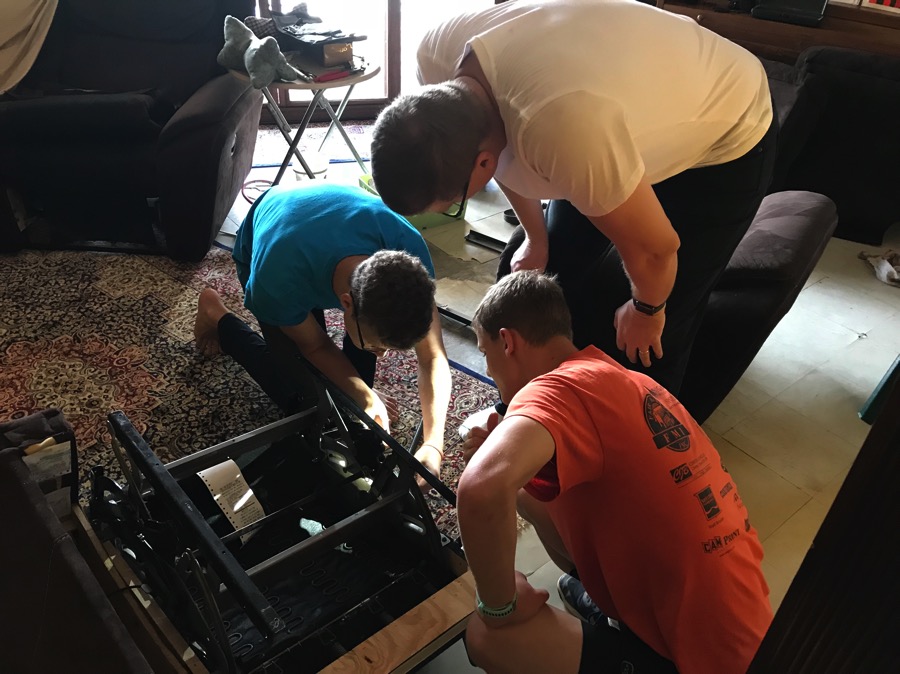
It took a couple hours, but the chair is usable again. It’s one less thing to have as a niggling stress always in the background. And we can again enjoy this thing God provided for us!
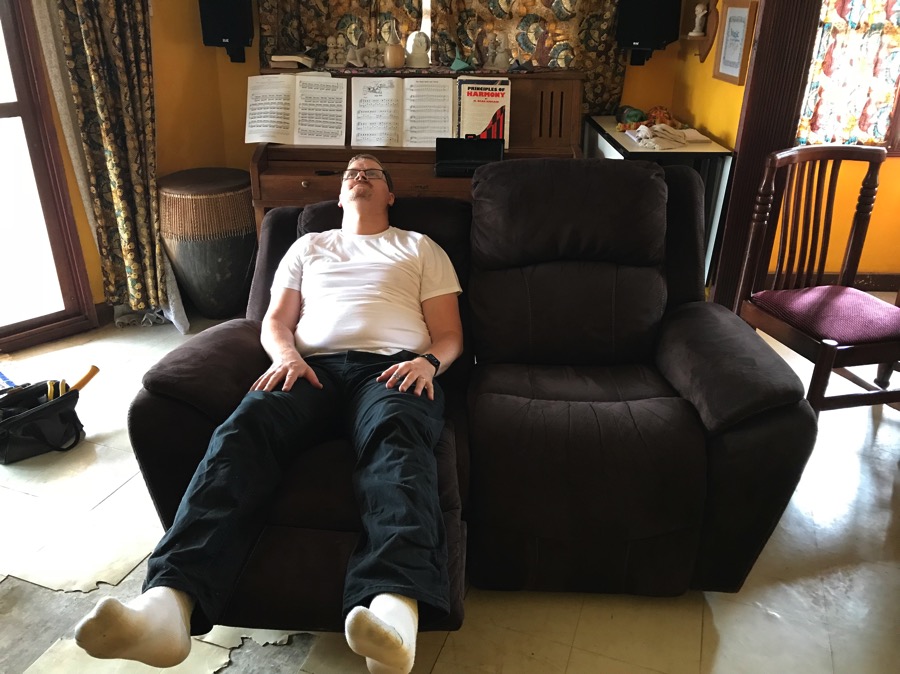
It’s almost been a year since we got back to Uganda from furlough. As I think back over the last couple years, here are some things that came to mind…
We were stuck in Egypt. The man we’d hired to take us to the airport hadn’t shown up at the appointed time. Turns out, because it was Ramadan, he’d passed out on the way to get us and had to be taken to the hospital.
I messaged my family about our quandary. My sister messaged back “Too bad you can’t call an Uber.”
An Uber? What was an Uber? I’d never heard of it before. So I asked. And she explained it. She was gracious. It hadn’t been a thing the last time I was in the US.
* * *
We hadn’t been in the States long when I needed to make a Walmart run. I found what I needed and made it to the cash register to pay without crying or having to ask for directions.
I hadn’t used a debit card in years. (Where we are in Uganda is cash only. I’m not aware of any stores in our town that take debit cards as payment. We used to have one but it closed.)
I thought I knew what to do. I swiped my card. “Please insert card in the chip reader” came the error message.
“You can’t swipe it. You have to insert the chip,” said the lady at the checkout.
“I don’t have a chip,” I said. “All I have is this card.”
“No. The chip. The chip there on the card.” She rolled her eyes and walked around the counter. “Here, let me.”
Then she showed me how to use a chip reader. While everyone behind me also rolled their eyes and groaned. I didn’t blame them.
* * *
I needed a dish drain rack while in the US. In Uganda, I know of at least 5 different stores where I can buy one. But I stood in Walmart for a long time contemplating in which department I’d find it. I finally ended up wandering the aisles until I located them.
You see, dish drain racks are sold in plastics stores here, not in housewares stores.
You buy eggs at the gas station or hardware store. (You can get them at the grocery store, but you pay more there.)
You can buy hair dye and sewing supplies at the convenience “store” up the road.
To shop in Uganda, you have to think outside the box. It’s difficult to begin thinking inside the box again when you visit the US.
* * *
The term “fast food” in Uganda is a misnomer. “Fast food” here takes between 1.5 and 2 hours to receive once you’ve ordered it. We get around this by getting the phone number for our favorite places and placing an order a couple hours early so it’s done by the time we’re ready for it.
The first time we ordered food in the US after living in Uganda for a few years, it came out in less than 30 minutes.
“Did they even cook this?” I blurted before I even thought about it. We’d gotten so used to the wait, that it seemed abnormal to not have to wait very long.
* * *
We’re always surprised by the pace of life in the US.
Everything moves slower in Uganda. You learn to expect it. Most people don’t rush around to do anything. You can get things done “now” — sometime in the future, eventually — or “now now” — they’ll be working on it in the next hour or two. If you rush around and try to do things at your own speed, you get frustrated. Consequently, you learn to do everything slower.
You learn not to arrive “on time” because “on time” here is at least an hour after the time they told you on the invitation or schedule.
You learn to talk slower because people can’t understand your accent and you struggle to understand (or pick) theirs.
Evenings are spent at home with family. You don’t go anywhere after dark because it’s not safe. There aren’t street lights so you really don’t see pedestrians or cows until you’re right up on them and it’s too late.
Then you reach the US where “on time” is 20-30 minutes early. People talk so fast you can’t hear them fast enough. You have one event after another scheduled throughout the day and into the late evening.
It’s overwhelming when you’ve adjusted to something else. Just simply driving after dark is terrifying when you haven’t done it for years.
* * *
There are also adjustments when we’ve been in the US and come back to Uganda. When we arrived back after our last furlough, we found out the water company was having problems. We were without water more times in the first 3 months of being in Uganda again than we had been the entire 6 years previously put together.
A grocery store we liked (because they sometimes carried items geared toward foreigners — like Chinese food) closed.
The internet, which had always been iffy before, was rarely faster than the old dial-up speeds from the 1990s. Sometimes it was off for days and weeks at a time.
The roads in our area had deteriorated to the point they were more pothole than road.
Uganda was still in a drought. Our once-green mountain was dry and brown. This lasted until we’d been back in Uganda for almost 4 months.
The changes were jarring. It took us longer to adapt back to life here than we would have liked.
* * *
So, when you encounter a missionary and they seem clueless or uncertain, try to be understanding. They may not have any idea what is going on and are just winging it. Take a minute to let them catch up. Ask if they have any questions. Spell everything out, even if you think they should understand it. They might not.
They may be overwhelmed by everything around them. By everyone around them. They may not be handling how fast everything moves. They might feel like crying every time they look at the available choices everywhere they go — from Walmart to restaurant menus.
Because there’s always a learning curve to staying relevant to your culture of origin when you’ve been away from it for a while. And there’s always a learning curve coming back to your host culture.
We arrived back in Uganda a year ago. James had gotten a bunch of work done on the vehicle before we came back. We thought it needed an overhaul but it ended up needing a whole new engine. The mechanic replaced some seats that were falling apart, and put on new tires. Then he painted the whole thing to deal with rust forming on the hood and roof. It looked like a brand new car.
But it didn’t sound like one. The new engine sounded great! But the air conditioner blower had an….odd…. sound. Sort of a low growl. I have hearing loss in one ear and the pitch was enough to make me feel like my teeth were trying to vibrate out of my mouth. But I put up with it. We have a new engine, right? Everything is working like gangbusters, right? :cue nervous laughter:
In recent days the sound got worse. Sometimes we’d hit a bump in the road and the fan would start a high-pitched whining sound. There’ve been a LOT of bumps in our roads, too. The other day we hit a bump and the growl increased in volume. We turned off the fan for a couple minutes, turned it back on and voila! the noise when back to it’s normal growl. We decided the fan motor must be dying and tried not to worry about it.
We usually walk everywhere in town, but now and then we’re in a hurry and drive. Last night was one such time. James needed to get to town and back quickly. He and Ethan jumped in the vehicle and left.
They hit a bump (as we’re wont to do) and the fan started rattling and blowing dust out of the vents and all over them. They turned off the A/C but the rattle didn’t stop. James drove it the rest of the way home, parked it, and called the mechanic. We figured the motor for the fan had died. He wanted to be sure the serpentine belt wouldn’t break if we drove it to church and back today.
The mechanic was about 2 hours away and he said he’d come straight here and look at it. We were thrilled about this! We had a couple hundred doses of malaria meds we needed to take to church.
He’d only been at our house checking the fan for a few minutes when he texted the following picture to James:
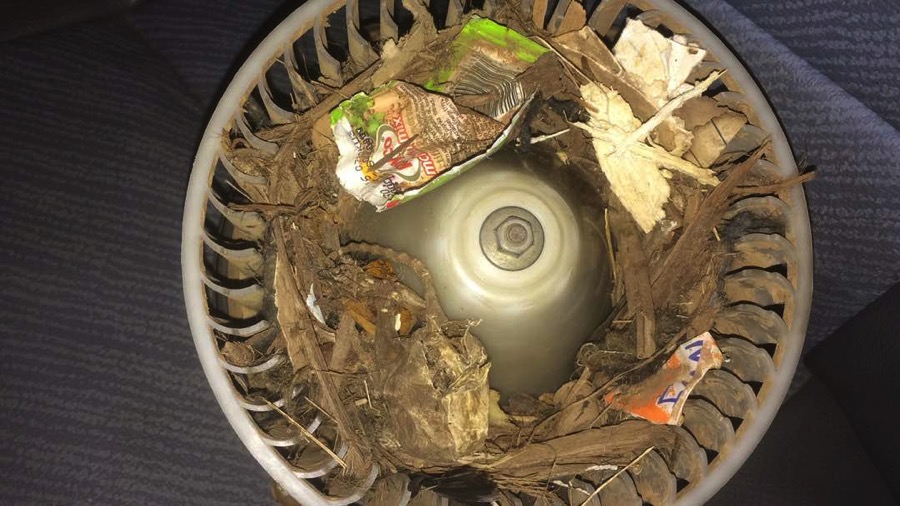
That, my friends, is the fan housing in the state the mechanic found it. Sometime, before we came back from furlough, a rat had built a nest inside. There were trash, sticks, and even a dead bird or two in there. (Where is the barfy emoticon when you need it?) Then, that dirt and air had been blowing over us when we rode in the vehicle.
And we wondered why we kept getting head colds all year. :-/
The mechanic cleaned it out. Now it sounds just like a fan should.
We got to church with no trouble and delivered all the medicine. They’ve repaired part of the road. Hopefully, they’ll get another big chunk done before we go out again.
In the meantime, I’m grateful to not be breathing in ratty air! Literally!
I haven’t posted a blog update in a while. Sometimes (thankfully!) things go smoothly and we don’t have anything unusual happen. We keep pretty busy with living life as a general rule. It’s nice when the car works, church services go smoothly, and nothing unexpected happens. Here are a few of the things we’ve had happen in the last couple weeks. Not enough for a blog post on their own, but each significant in its way.
A couple weeks ago the folks at Kabazana got in touch with James. The next door neighbor to the church had been grazing his cows on the church property. The church people had planted beans there and then put up a hedge (that wasn’t yet very big). He turned his cows loose in there anyway and the cows ate the beans.
Through a course of events, the local chairman got involved. He told the church people they had to let the man graze his cows there. Turns out, the neighbor had bribed him with a cow.
We started asking around to figure out what legal measures we needed to have in place so the chairman couldn’t do this. Meanwhile, they went to talk to the chairman’s boss. That man had heard good things about the church. And he hadn’t been bribed. He issued a certificate, like an occupancy permit for the property there. He said the church was allowed to fence in their property and keep the cows off.
The next week, we put up a fence. Well, the church people did. 🙂 It’s a simple structure, just poles and barbed wire. The plan is for the hedge to grow up along the barbed wire. It will provide a place for the church people to grow things and hold classes without having to dodge, well, cow mess.
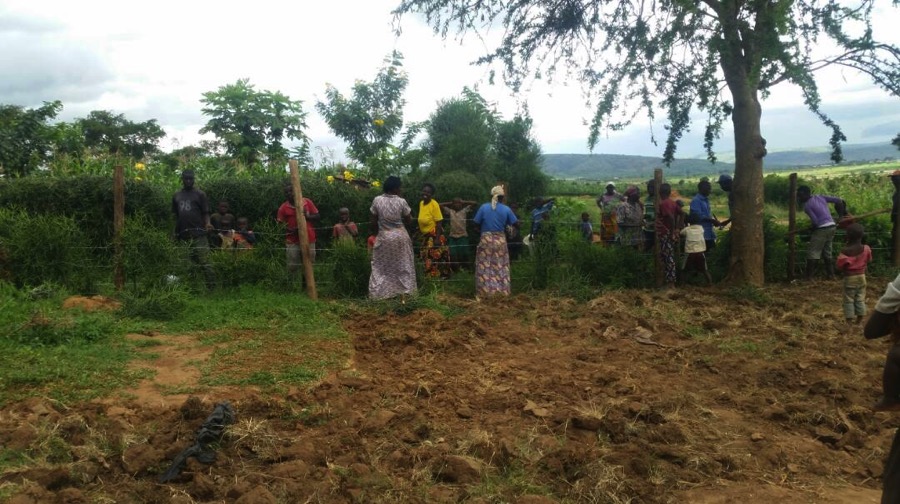
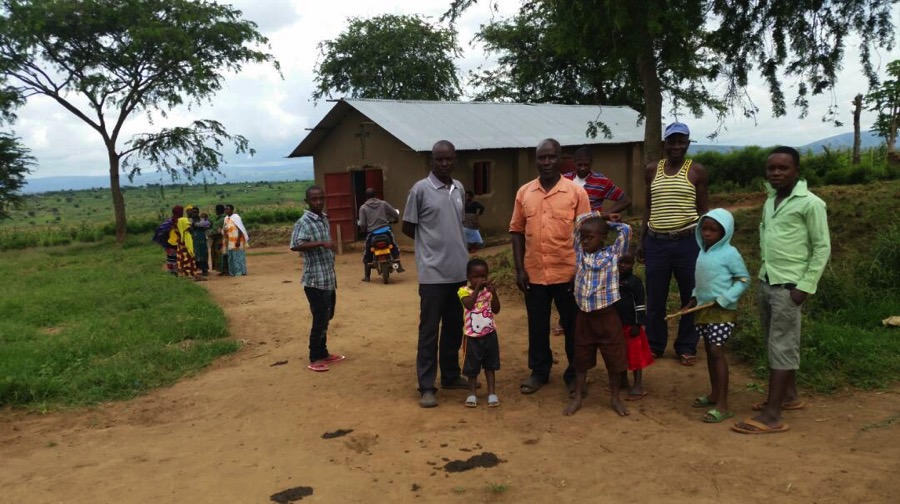
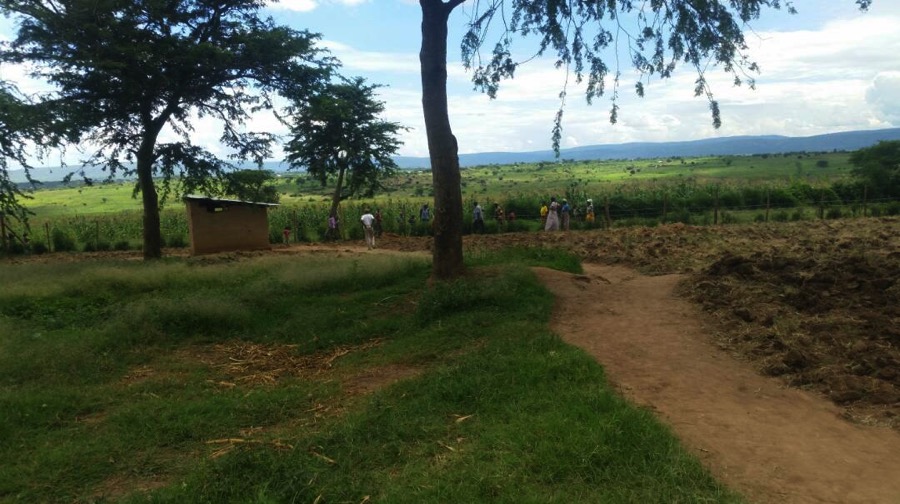
When we were in the US we raised money to put in wells at our churches. God provided enough for one well. After several very bad dry seasons, everyone could see the need for better access to water.
Our only struggle was finding a place who would dig the well for a reasonable price. We found a place in Kampala but they wanted $2500 just for the survey (they use ground penetrating radar to locate water and see how deep it is and how much water is available). That price seemed high to us, so we kept looking.
Not long ago, a “Water Solutions” place opened in our town! They dig wells and boreholes, among other things. We stopped in there to talk with them about our need at Sangano. They can do the survey for 1/4 of the price the other place gave us! Not only that, because they are in our town, they are close enough to do maintenance easily and inexpensively. We’re hoping to hear back about the survey early this next week!
It’s the end of the rainy season here. We’ve had a great rainy season and the crops look wonderful. But a good rainy season also means more mosquitos. They always get frantic when the rain stops and malaria cases shoot up.
God provided a gift this month that was enough, not only to put up the fence at Kabazana, but also to buy medicine for our church people. We know of quite a few cases of malaria and “flu” out there right now so we’ll be taking a supply to each of the churches on Sunday.
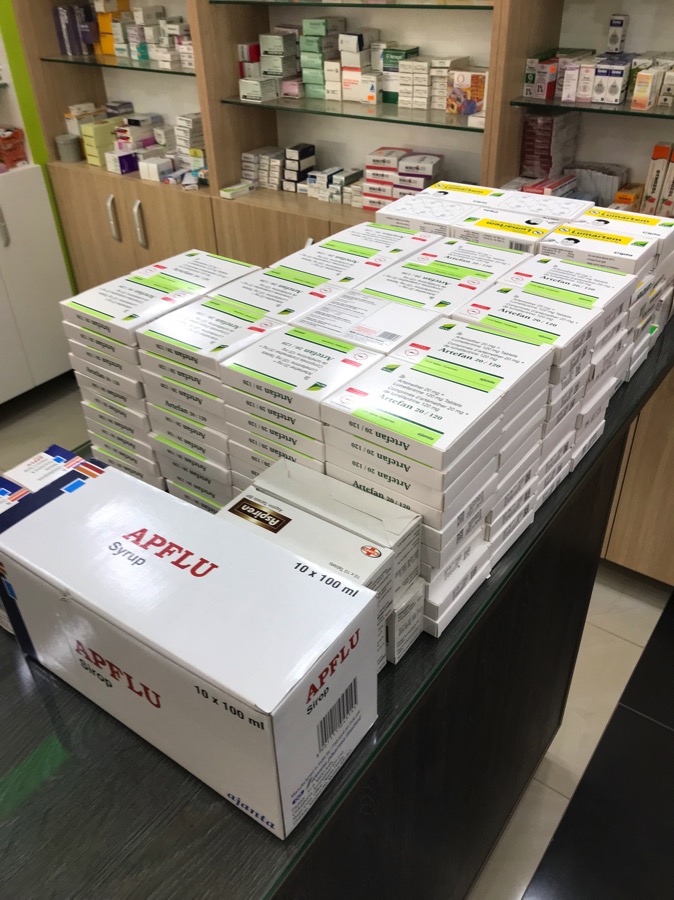
Last Sunday, Esperanza told me she’d hurt her back and needed something for the pain. She also needed food and charcoal. We feel that 1) God commands us to care for widows and 2) that care is supposed to come through the local church. So we gave money to the church leaders to get her the things she needed immediately. We’re taking the medicine for her back on Sunday. (Frankly, when I reach 105 years old like Esperanza, I hope back pain is my only complaint! This sweet lady walks to and from church every week.)
The church at Isanja hasn’t weathered the rainy season well. While it hasn’t fallen down like the church at Ngarama did last year, it is slowly deteriorating. Large cracks have formed at one end of the church. You can see through to the outside. If they get a bad storm (which sometimes happens at the beginning and end of the rainy season) that end of the church will probably fall down.
We’re praying, along with the church people, that God provides for their church to be rebuilt. It’s quickly becoming urgent.
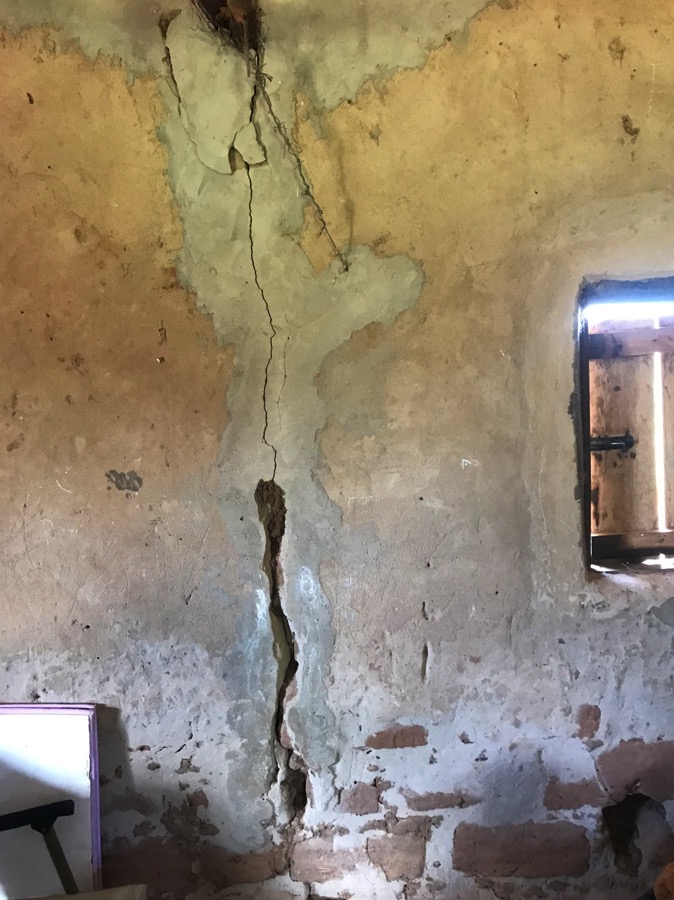
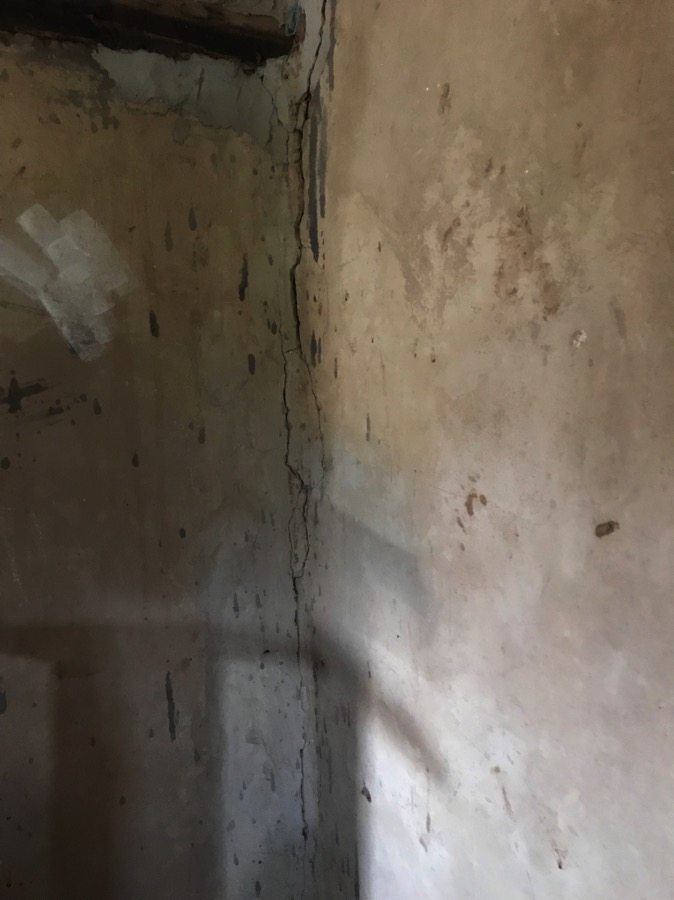
A few months ago I posted about shopping in our open air market. A couple weeks ago I posted a video of a trip there.
We don’t do all of our shopping in the open air market. Our town has several good grocery stores where we buy other things — the things you can’t get at the market.
We used to have a huge, chain grocery store in town. You could get things there that you couldn’t get anywhere else. They went out of business due to corruption in their leadership.
Thankfully, several of the other grocery stores have stepped in to take up the slack.
We do most of our shopping at Apple Door to Door Supermarket. Nishit, who owns the store, used to manage another grocery store in town (that also went out of business, but that’s another story). When he was fired from his job at the other grocery, he opened Apple Door to Door. He stocks things that many of the other stores don’t — like Dr. Pepper, and American chocolate. He also keeps bacon and sliced ham in stock. We buy Indian snacks for homemade snack mix from him. I’m sure his eyes get shilling signs in them when he sees us coming. 😉
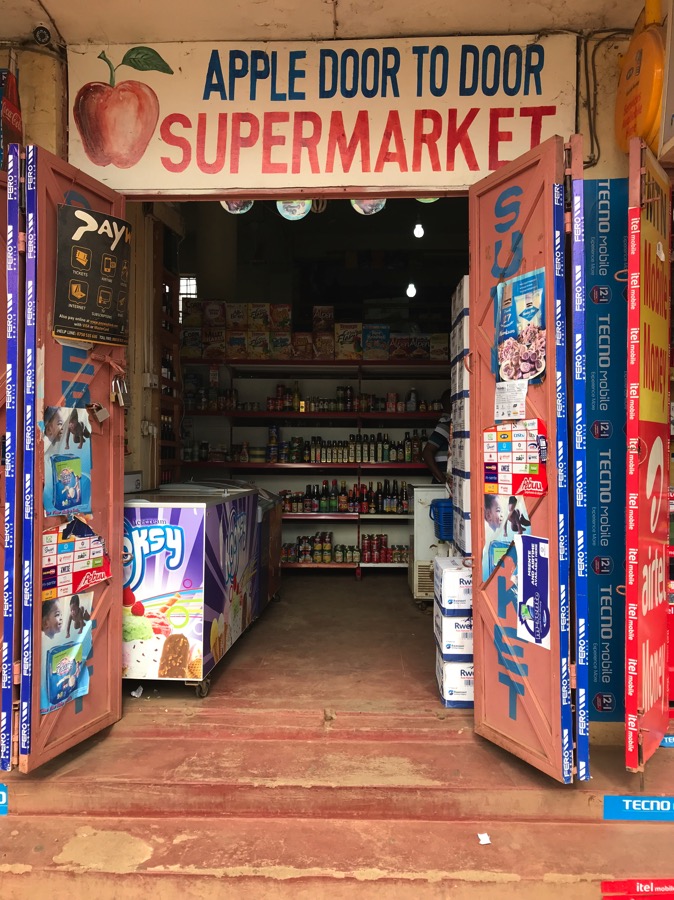
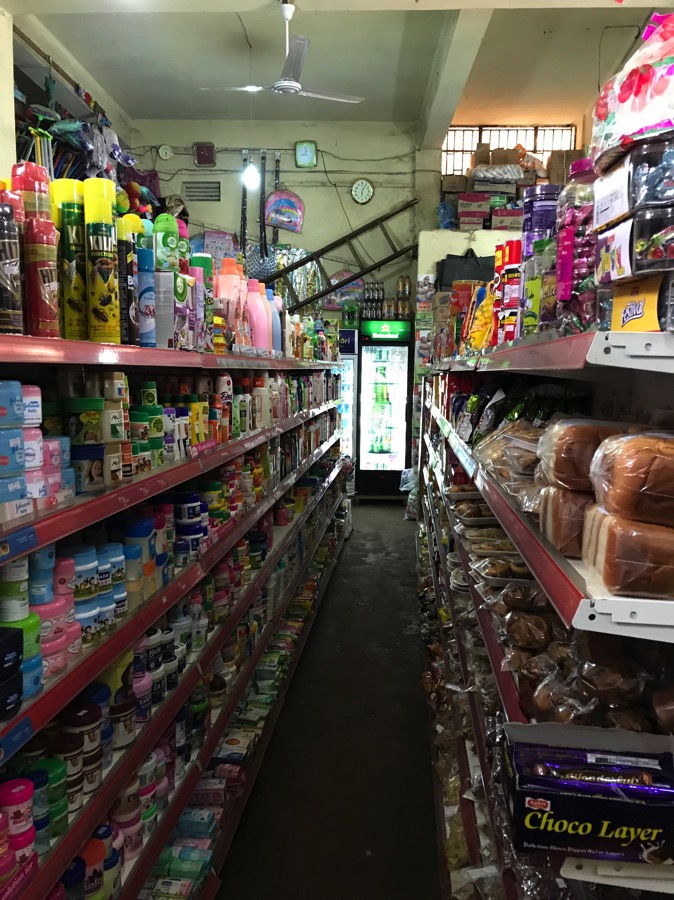
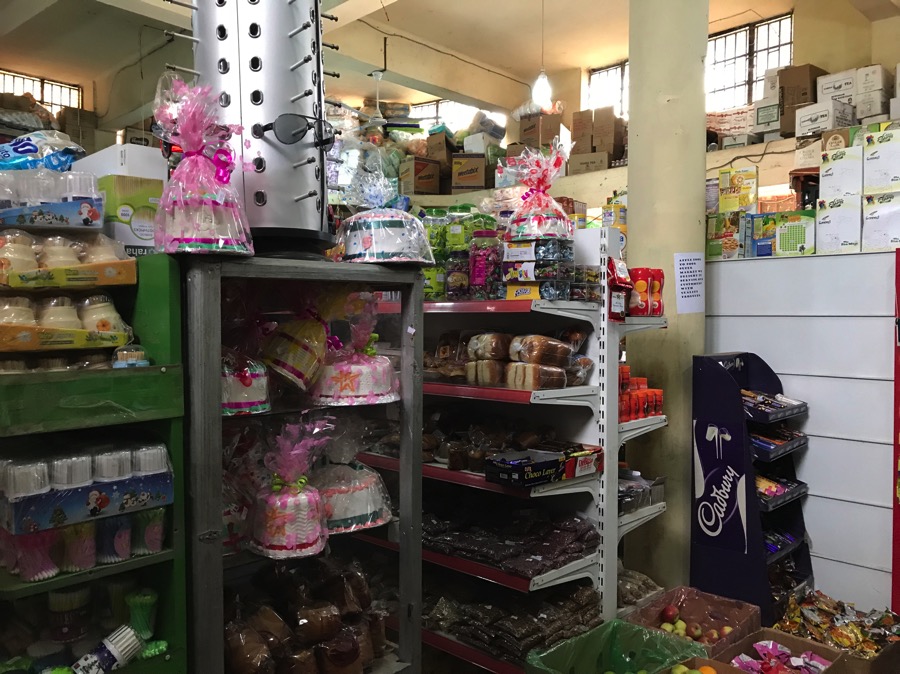
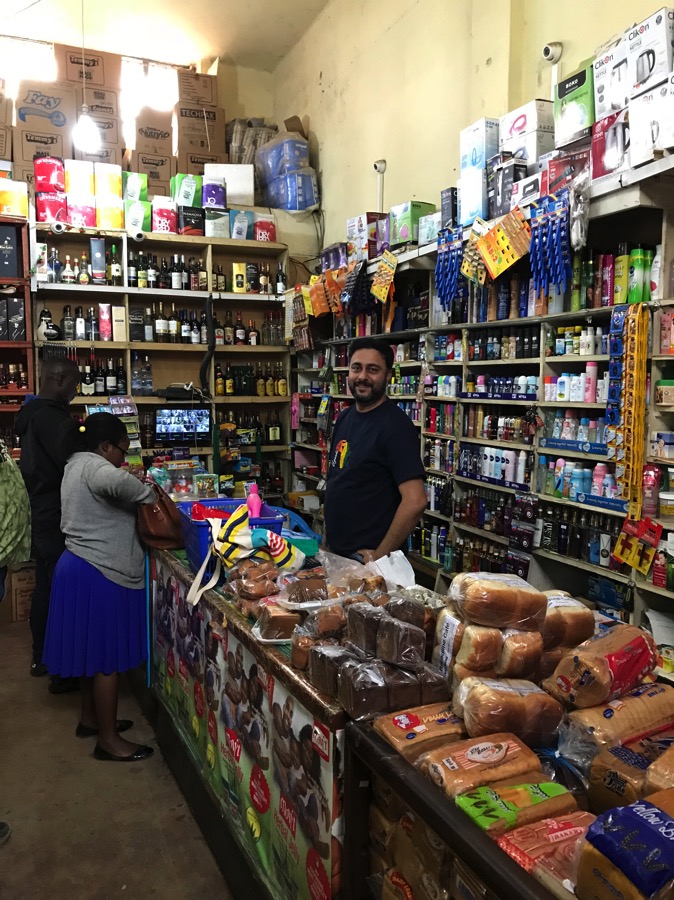
The great part is that Nishit has become a friend. We’ve watched his two girls grow up. His oldest is the same age as my youngest. He and his wife go for morning walks and we see them while we’re out jogging. Sometimes he stocks things just because he knows we like them.
Golf Course Supermarket opened right before the other big chain store opened. I didn’t really like Golf Course at first. Their prices were higher than everywhere else. Then they learned about competitive pricing and everything changed.
Golf Course is owned and run by a sweet Ugandan woman. She has made changes little by little to attract a diverse clientele. It helps that the store is less than a mile from our house, so if I need something I can walk there and back in less than 20 minutes.
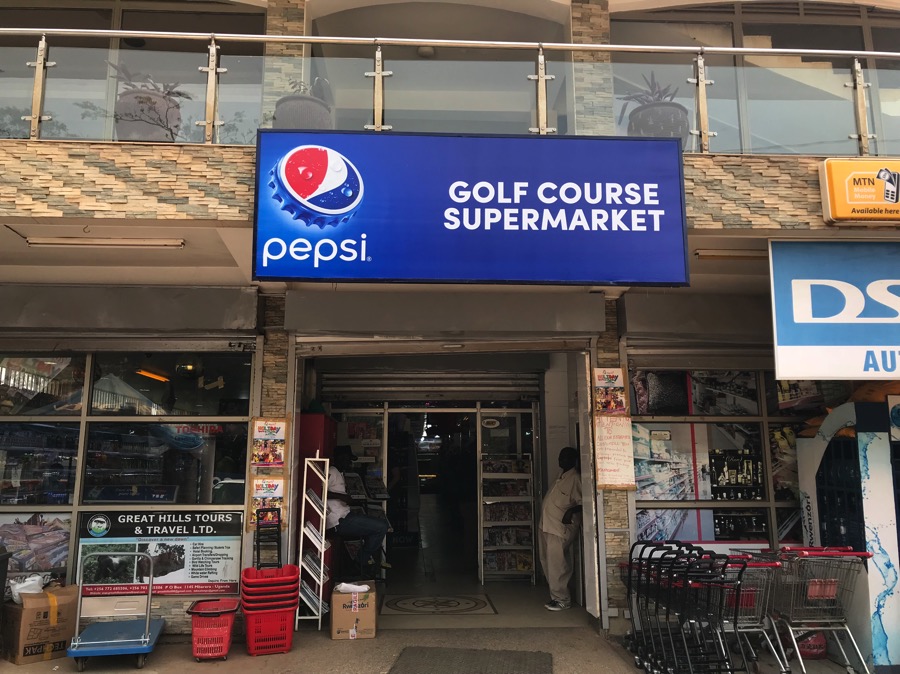
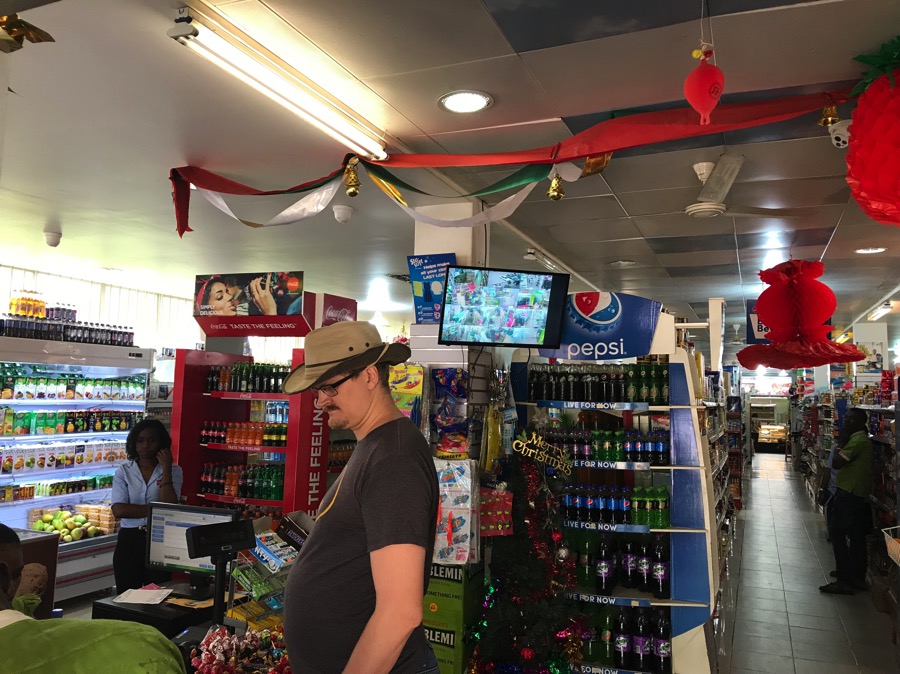
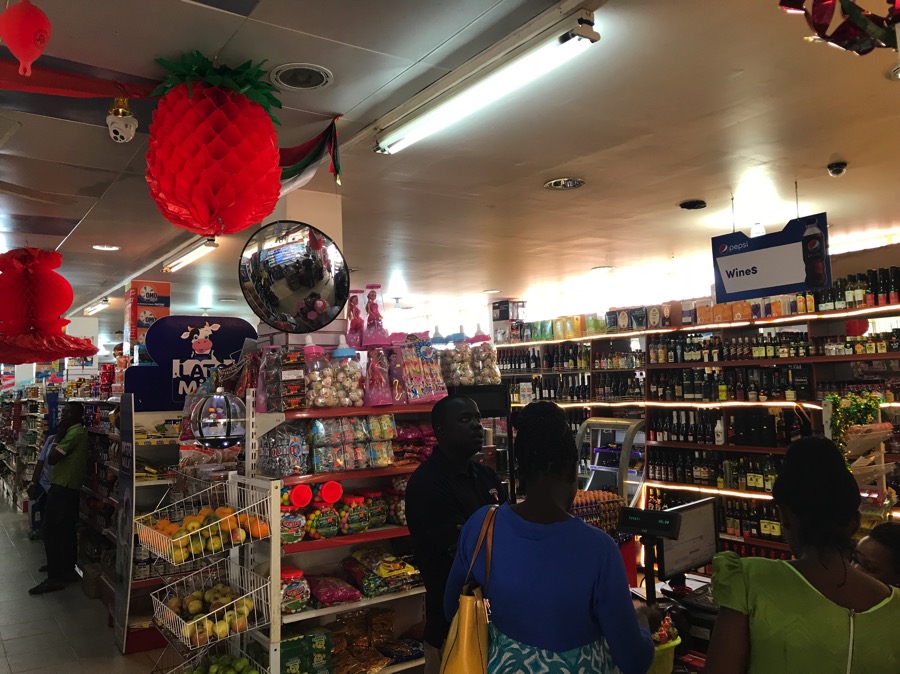
Kirimi Supermarket used to be a tiny, hole-in-the-wall store. I rarely shopped there because it was out of my normal route to and from town. Our guy, Athen, kept telling me I needed to check out the store.
About 3 years ago, they built a new, bigger store. It’s also owned and run by a Ugandan woman, though I’ve only seen her a couple times. She stocks primarily things that locals will enjoy. The longer we’ve lived here, the more I buy local stuff.
About 9 months ago, they opened a bakery and deli at Kirimi. The big chain store had a huge bakery and deli but it closed at least a year before the store. Having this open at Kirimi has been a blessing! Their whole wheat bread is soft and delicious. They sell individual Ugandan pizzas. (Not like American pizza, but still good). The store also sells several things we like but can’t find at any of the other stores.
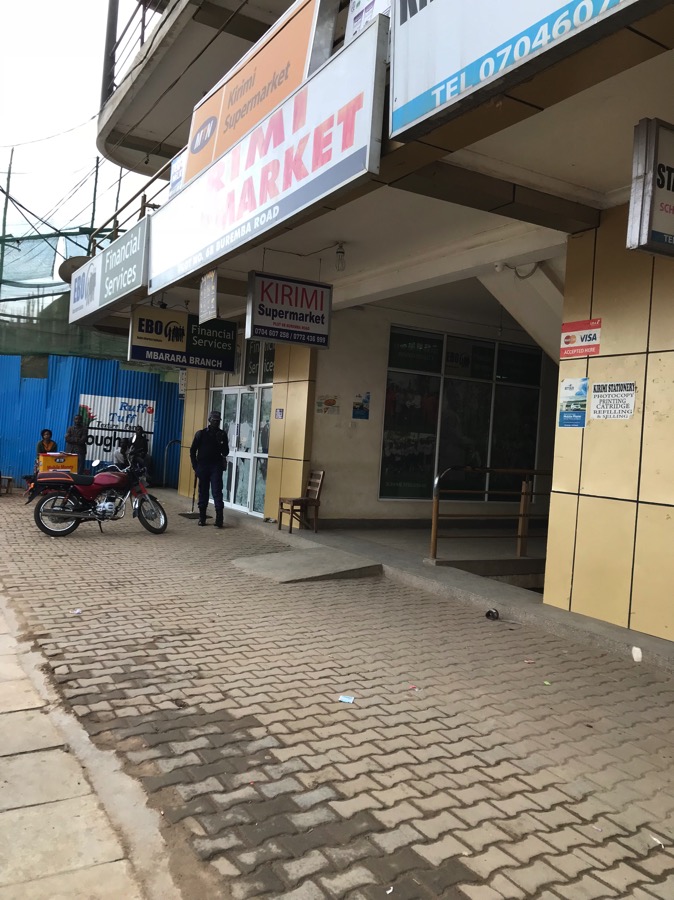
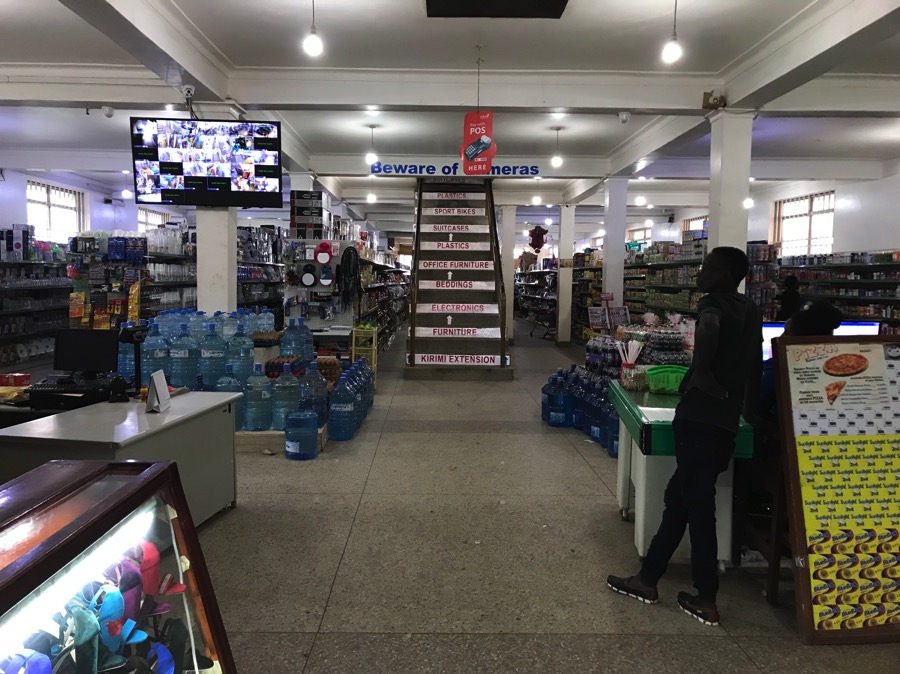
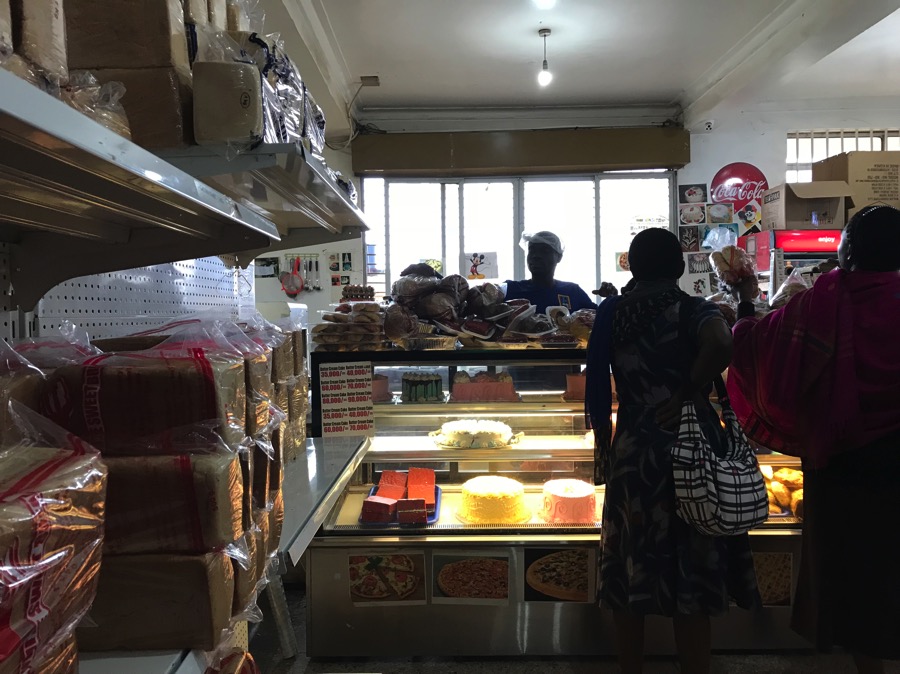
I carry my own cloth shopping bags everywhere and all the shopkeepers in all the grocery stores tease me on the rare occasion I forget. They also tease when I shop by myself because James usually goes and helps me carry it home.
I like that there isn’t usually a huge selection. You can find what you need, but they only have one brand of it. Easy decision. Those stores in the US with 100 different kinds of the same thing make me want to cry. Here, my choice is already made.
I personally think that shopping was one of the easiest things for me to adapt to here. It’s simple, straightforward, small town, local. I love that I’m supporting local business people, most of them women. I love that I know the clerks and they know me. Like everything else here, it’s all about the relationship. And that relationship is how you can have a real impact on people’s lives.
(All photos taken with permission from the store owners.)
This site uses cookies. By continuing to browse the site, you are agreeing to our use of cookies.
Learn moreOKWe may request cookies to be set on your device. We use cookies to let us know when you visit our websites, how you interact with us, to enrich your user experience, and to customize your relationship with our website.
Click on the different category headings to find out more. You can also change some of your preferences. Note that blocking some types of cookies may impact your experience on our websites and the services we are able to offer.
These cookies are strictly necessary to provide you with services available through our website and to use some of its features.
Because these cookies are strictly necessary to deliver the website, refusing them will have impact how our site functions. You always can block or delete cookies by changing your browser settings and force blocking all cookies on this website. But this will always prompt you to accept/refuse cookies when revisiting our site.
We fully respect if you want to refuse cookies but to avoid asking you again and again kindly allow us to store a cookie for that. You are free to opt out any time or opt in for other cookies to get a better experience. If you refuse cookies we will remove all set cookies in our domain.
We provide you with a list of stored cookies on your computer in our domain so you can check what we stored. Due to security reasons we are not able to show or modify cookies from other domains. You can check these in your browser security settings.
We also use different external services like Google Webfonts, Google Maps, and external Video providers. Since these providers may collect personal data like your IP address we allow you to block them here. Please be aware that this might heavily reduce the functionality and appearance of our site. Changes will take effect once you reload the page.
Google Webfont Settings:
Google Map Settings:
Google reCaptcha Settings:
Vimeo and Youtube video embeds:
You can read about our cookies and privacy settings in detail on our Privacy Policy Page.
Privacy Policy